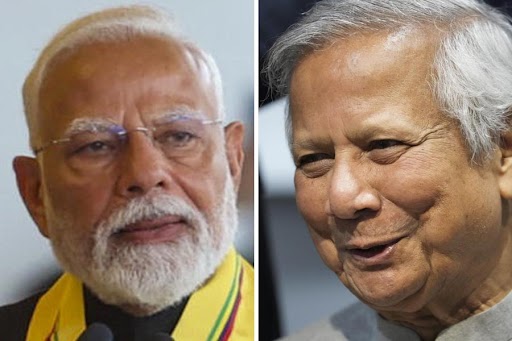As Bangladesh stands on the edge of political uncertainty, a carefully timed letter from Indian PM Narendra Modi to chief adviser Muhammad Yunus has stirred diplomatic conversations.
Modi extended felicitations to the people of Bangladesh on the occasion of the Independence Day.
Modi’s message: A subtle signal?
In a message shared by the Indian High Commission in Bangladesh, Modi wrote:
"I extend my felicitations to you and the people of Bangladesh on the occasion of the National Day of Bangladesh. This day stands as a testament to our shared history and sacrifices, that have laid the foundation of our bilateral partnership."
Acknowledging the deep-rooted ties between the two nations, he continued:
"The spirit of the Liberation War of Bangladesh continues to remain a guiding light for our relationship, which has flourished across multiple domains, bringing tangible benefits to our peoples. We remain committed to advancing this partnership, driven by our common aspirations for peace, stability, and prosperity, and based on mutual sensitivity to each other's interests and concerns."
The reference to the “Liberation War” is a powerful nod to Bangladesh’s foundational struggle, a narrative deeply intertwined with India’s role in 1971.
Even as the Yunus-led interim government struggles to maintain public confidence, murmurs of a political resurgence for former Prime Minister Sheikh Hasina are gaining traction.
Dr. Rabbi Alam, Vice President of the United States Awami League and a close ally of Hasina, made an emphatic declaration in an interview with ANI on March 13. Calling the interim government illegitimate, Alam asserted that “the younger generation has been manipulated” into pushing Hasina out of power. He further demanded that Yunus step down and return to his previous role, describing Hasina’s return as “inevitable.”
India has so far maintained a cautious stance.
Alongside Modi’s message, president Droupadi Murmu also extended greetings to Bangladesh President Mohammed Shahabuddin, underscoring the long-standing ties between the two nations.
Modi’s words may not constitute an explicit endorsement of any political faction, but the invocation of shared history and stability signals New Delhi’s broader interest in ensuring that its eastern neighbour remains a reliable partner.
A nation on the brink
Reports suggest that Bangladesh may be heading towards a dramatic political shift, with speculation mounting over a potential military takeover.
Earlier, India Today sources indicated that the Bangladeshi military, led by Chief of Army Staff General Waker-Uz-Zaman, convened an emergency meeting earlier this week.
The meeting, attended by top-ranking officials—including five Lieutenant Generals and eight Major Generals—focused on the military’s possible role in stabilizing a country increasingly distrustful of the interim government.
At the center of this turmoil is Nobel laureate Muhammad Yunus, whose leadership of the caretaker government has faced mounting criticism. With tensions rising, his hold on power is now in question.

